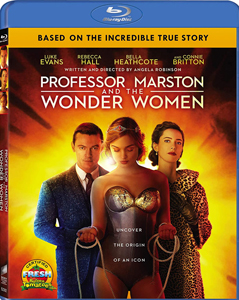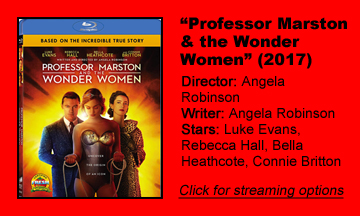The creation stories of the three biggest DC heroes all have a notable amount of injustice behind them. “Superman’s” Siegel and Shuster and “Batman’s” Bill Finger were denied credit for decades. But the story behind “Wonder Woman” – where there has never been debate that William Moulton Marston created her – is the weirdest, as chronicled in the biopic “Professor Marston & the Wonder Women” (2017).
Not directly about Wonder Woman
The story starts more than a decade before Marston created her in 1942, so superhero-flick fans might be disappointed that the film isn’t directly about Wonder Woman. And when it is, it’s about Harvard psychology professor Marston’s (Luke Evans) original vision for her, a combination of his wife, Elizabeth (Rebecca Hall), and their life partner, Olive Byrne (Bella Heathcote).
The injustices the polygamous trio face are societal rather than comic-industry-born.
Writer-director Angela Robinson’s film is interesting to watch nearly a century after the trio faced discrimination, because polygamists are still a group in the shadows in this era of widespread interest in equal treatment in society and under the law.
“Professor” is a strange, stiff film, even though it ably makes the point that Bob, Elizabeth and Olive are not crazy people to be feared.
It spends a lot of time dealing with Bob’s DISC theory without smoothly incorporating it into the story. He theorizes that humans all have degrees of dominance (D), inducement (I), submission (S) and compliance (C) within them, and that embracing these traits is the key to happiness, particularly in romantic relationships.
Fighting their own truths
Interestingly, Elizabeth, the most outspoken and anti-establishment of the trio, fights against her nature the most. But Bob and Olive also work to overcome conservatism ingrained in them by society.
In the funniest scene, Bob takes a lie-detector test and the needle goes wild when he answers “no” to “Are you in love with Olive?” (The lie-detector test is one area where Marston has similar bad copyright luck as those other DC creators: Someone else patented it, so he didn’t make money off his invention.)
The way “Professor” chronicles the three-way love match is certainly unique, as Olive comes on to the other two by taking a lie-detector test about her love for them that she knows she’ll fail. An awkwardly long love scene follows, complete with a raid of the theater’s costume supplies.
A striking trio
Evans seems to live in these period pieces: He reminds me of his “Alienist” character even though you might say Marston is a Bizarro John Moore. Hall brings edge to Elizabeth. Heathcote looks like she was created in a lab mixing the DNA of Rose McGowan, Elisha Cuthbert and Rose McIver; she fits the bill of a strikingly beautiful woman who catches the eye of every male on campus.
While looking at Heathcote is not a difficult assignment, “Professor” drifts from digging into issues when the camera lingers on her, notably when Olive dresses as a proto-Wonder Woman, lit from behind through her blonde hair. It’s a striking image, but generally the film skimps on makeup and wardrobe; when Bob is dying of cancer toward the end, it’s hard to see past the strapping Evans.

In the flash-forward scenes of Bob arguing with a censorship panel led by Connie Britton’s Josette Frank, I of course side with the creator and I’m happy that the American government has largely outgrown its censorship period.
Controversies skimmed over
Still, the incongruity of a kids’ comic loaded with age-inappropriate bondage imagery is introduced only to be brushed over. If those early stories also play on another level as normal superhero yarns, then “Professor” misconstrues them.
If the comic truly is soft-core porn, how and why did kids of that era like “Wonder Woman,” and turn out just fine?
“Professor Marston & the Wonder Woman” doesn’t dig deeply into those questions, and it’s light on drama; an internal conflict toward the end isn’t earned. We know the trio as people, but we don’t get the full import of their influence on society or comics or even Wonder Woman herself, who is quite different in her modern portrayals.
For a more intellectual treatment, check out “The Truth about Wonder Woman” episode of “Secret History of Comics,” also from 2017.


